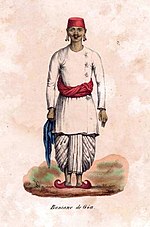Bania (caste)
Appearance
 A Goan Bania, early 1880s | |
| Languages | |
|---|---|
| Hindi, Marwari, Punjabi, Gujarati, Dialects of Marathi and Konkani.[1] |
The Bania (otherwise known as Baniya, Vani and Vania) is an occupational community of merchants, bankers, money-lenders, dealers in grains or in spices, and in modern times numerous commercial enterprises. The term is used in a wider sense in Bengal than it is elsewhere in India, where it is applied to specific castes.[2]
Etymology
Bania is derived from the Sanskrit word vaṇij or baṇij, which means merchant.[3] In western India the caste is called Vani or Vania. Although in Bengal the term is applied to all people who are involved in moneylending and similar activities, elsewhere in India it is used in the more limited sense of referring to specific castes.[2]
See also
References
- ^ Gazetteer of the Union Territory Goa, Daman and Diu: district gazetter by Vithal Trimbak Gune, Goa, Daman and Diu (India). Gazetteer Dept, published by Gazetteer Dept., Govt. of the Union Territory of Goa, Daman and Diu, 1979
- ^ a b Schrader, Heiko (1997). Changing financial landscapes in India and Indonesia: sociological aspects of monetization and market integration. LIT Verlag Münster. p. 68. ISBN 978-3-8258-2641-3. Retrieved 09-02-2012.
{{cite book}}: Check date values in:|accessdate=(help) - ^ Monier-Williams, Monier (1986). A Sanskrit-English dictionary etymologically and philologically arranged with special reference to cognate Indo-European languages (New ed., greatly enl. and improved. ed.). Delhi: Motilal Banarsidass. p. 915. ISBN 81-208-0065-6.
